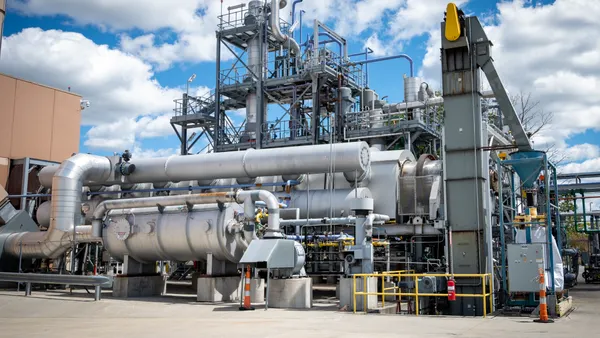Dive Brief:
- The British government consistently overestimates how much of the country's plastic packaging scrap gets recycled, according to a report from consultancy group Eunomia.
- Official government data claim the U.K. produced a total of 2.26 million metric tons of plastic packaging scrap in 2015, and that nearly 39% was recycled. But the report's analysis puts the numbers at closer to 3.5 million metric tons produced and a recycling rate at 23% to 29%, meaning UK plastic packaging recycling estimates might be inflated by up to one-third.
- If Eunomia's numbers are accurate, it's possible the U.K. failed to meet its European Union plastic packaging recycling targets each year from 2008-2012.
Dive Insight:
Contamination makes materials less valuable and more difficult to process, making recycling a less environmentally-friendly process than it might appear. Plastic scrap is one of the areas China clamped down on particularly hard this year because it says the materials it was purchasing had high levels of contamination, with everything from product labels to disposable diapers.
The Eunomia report points out another problem with contamination — that it can can skew commodities' weight figures. Even just a few food particles, labels or drops of water remaining on each piece of plastic scrap adds up and distorts the weight of items that are bought and sold by the ton. Plastic packaging tends to be thinner and more pliable than, for example, HDPE, making it easy for moisture or particles to become trapped in creases.
Variance in the United Kingdom's measurement practices may have created figures for contaminated plastic scrap on one end, and clean, dry scrap on the other. Combining figures for the two different grades is not comparing apples to apples, and Eunomia believes that led to some of the number distortion. The report recommends that all reported weights be collected in a standardized manner — only clean, completely dry items — to avoid future misrepresentation of the UK's recycling rates.
Although the discrepancy on the surface might appear to be an innocent oversight, the country's recycling system has been contending with claims of intentional manipulation. Recycling in the U.K., especially for plastic packaging, heavily involves producer responsibility programs, through which packaging producers must ensure that a certain proportion of their products are recycled. Producers prove their compliance by purchasing a Packaging Recovery Note (PRN), and the money is supposed to go toward improving recycling and growing capacity.
But critics say it's unclear where that money actually ends up. Plus, Eunomia's report points out the fees producers pay for a PRN are higher if the amount of plastic packaging in the market is higher. Thus, some claim producers have been manipulating the figures to make it seem like less plastic packaging is produced so they can pay lower fees.
That could have led to the government's lower plastics production estimate. If Eunomia's figures are correct, producers should be paying into the system for nearly 1.3 million additional metric tons of material.
Already, the report is intensifying calls for reforming the UK's recycling practices, especially producer responsibility programs.










